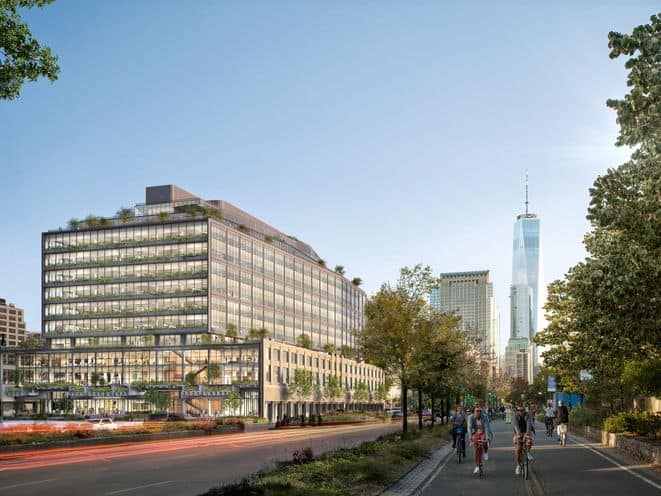Google announced Tuesday it plans to buy the St. John’s Terminal on the west side of Manhattan for $2.1 billion, in reportedly the largest commercial real estate purchase in America since the pandemic began.
The tech giant has been leasing the 12-story two-block parcel adjacent to the West Side Highway by West Street since 2018 and building out its offices there. The 1.3 million-square foot St. John’s Terminal building will anchor its new Hudson Square campus which also includes the buildings at 315 Hudson Street and 345 Hudson Street. The company already owns 111 Eighth Avenue and bought the Chelsea Market building for $2.4 billion in 2018.
Google said in a press release the purchase will close by the first quarter of 2022 and the site is expected to open by mid-2023 “as the new NYC headquarters for Google’s Global Business Organization.”
“New York’s energy, creativity and world-class talent are what keep us rooted here and why we’re deepening our commitment with plans to purchase St. John’s Terminal,” said Ruth Porat, Alphabet and Google Chief Financial Officer, in the release. “We look forward to continuing to grow along with this remarkable, diverse city.”
“What a vote of confidence in New York City. What a statement about the future of our economy and jobs for New Yorkers — good paying jobs,” said Mayor Bill de Blasio at his press briefing Tuesday. “Google is leading the way here in our economic comeback but also further asserting what we know more and more: New York City is now one of the great tech capitals of the world.”
Google’s presence in New York City began more than 20 years ago with a single employee working out of a Starbucks in Manhattan, noted the company’s Vice President for Global Client and Agency solutions Torrence Boone at the mayor’s press briefing.
The company has about 12,000 employees in the city now, with plans to add another 2,000 employees.
One outside analyst said Google’s acquisition of so much real estate could signal New York City’s enduring value to companies.
“I think this shows that they still think that New York is a place where it makes sense for them as a business, despite the costs of operating in a high rent, high tax regime area,” said Blair Coulson, Vice President & Senior Credit Officer at Moody’s Investors Service. “It makes sense for them to be located there because they know that there are synergies that come from that, there’s the capability to attract talent that comes from that.”
Boone said the company is still committed to a hybrid work model for the time being. In August, Google and Alphabet CEO Sundar Pichai said they were extending their voluntary return-to-office plan until January 10, 2022 “to give more Googlers flexibility and choice as they ramp back.”
The site plans also call for renovations at Pier 57 to be completed next year with more office space for Google, a public food hall, community space, galleries, and what the company says will be “the city’s largest public rooftop space and educational and environmental programs run by the Hudson River Park Trust.”
The news was not universally celebrated Tuesday. Andrew Berman, the Executive Director of The Greenwich Village Society for Historic Preservation, said so much of the area’s housing stock — including affordable housing — has already been eliminated as commercial buildings rise. The neighborhood, west of Soho, will also be home to Disney’s new 1 million square foot complex a few blocks away.
“We’re seeing housing, including rent-regulated housing, being destroyed to make way for tech-related office buildings. We’re seeing historic buildings being destroyed to make way for tech-related office buildings,” Berman said.
“I have no particular beef with Google per se,” he added. “But I think that the city is not doing its job in terms of directing development, certainly in this part of New York, in an appropriate way to maintain a balance between welcoming new development and new businesses and the tech industry, but also protecting neighborhood character, protecting existing housing, protecting historic buildings.”

